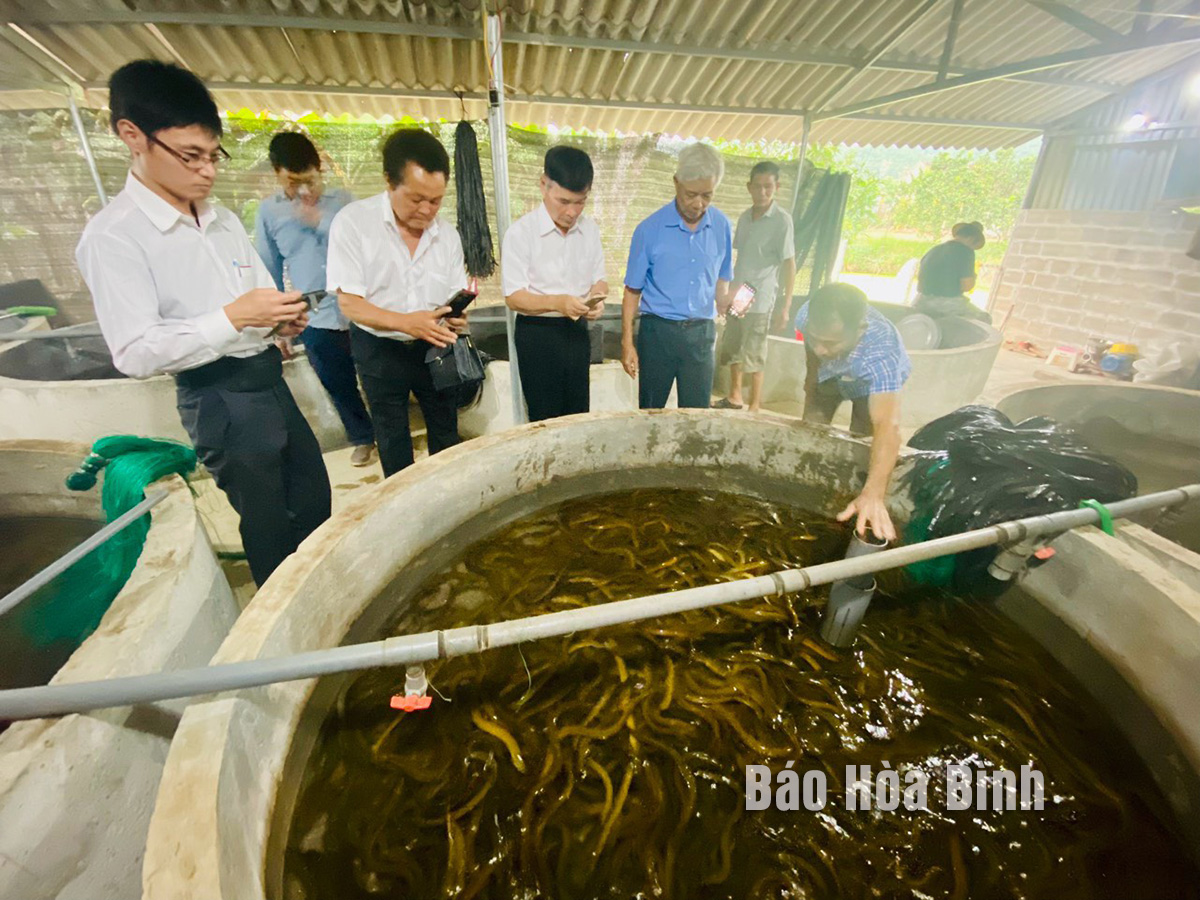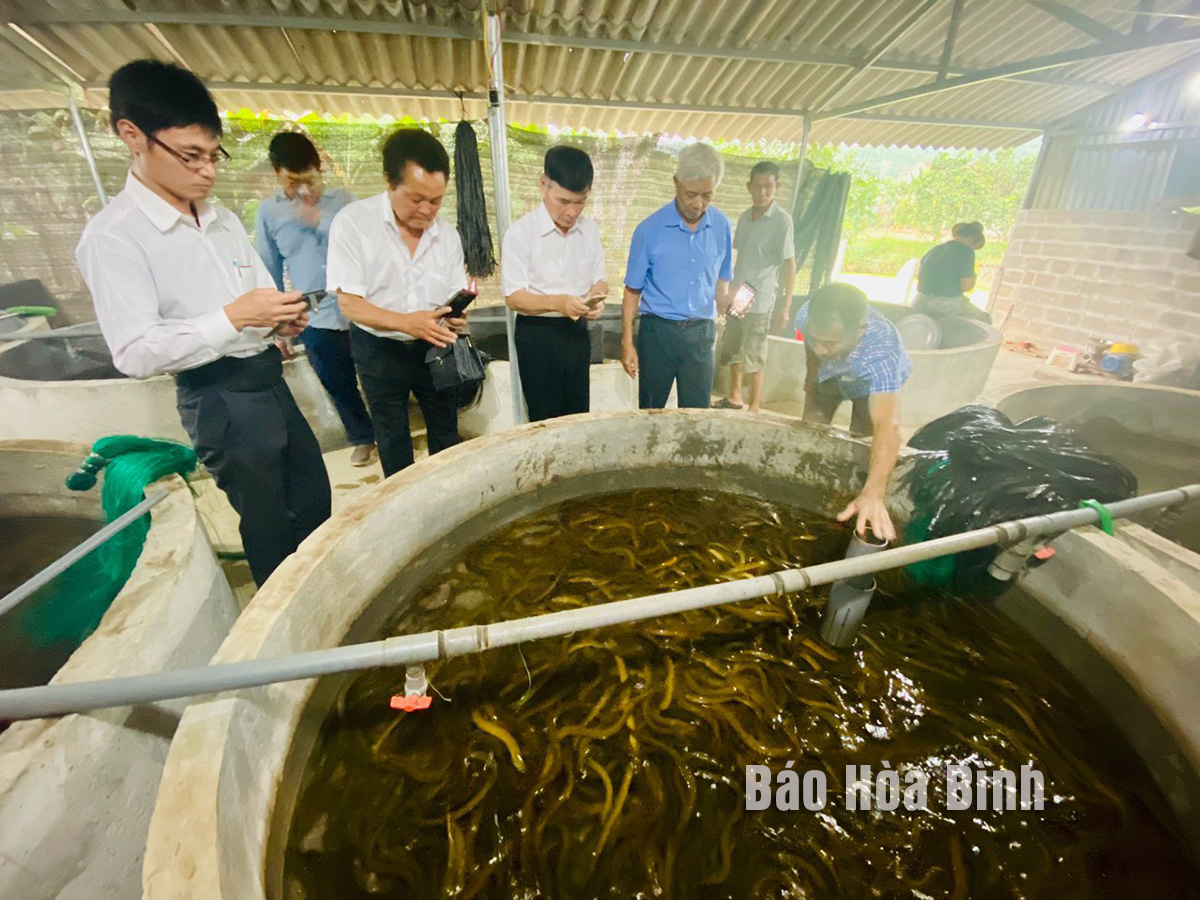
Doan Ket, a remote commune of Yen Thuy district, has more than 98% of its population being people from ethnic minority groups, mainly Muong. Over the past years, local residents have upheld the tradition of solidarity as well as their trust in the leadership of the local Party committee and administration to make joint efforts to develop their hometown and meet new-style countryside criteria.
Commercial eel farming has helped residents in Men
Lien Ket hamlet of Doan Ket commune, Yen Thuy district, secure a livelihood
with stable income.
Among outstanding moves to care for people’s
material and spiritual lives over the past years, Doan Ket has optimised
capital sources and effectively carried out projects to help people develop
livelihoods, improve the capacity of grassroots civil servants, and build
infrastructure to give a facelift to this ethnic minority area.
Chairman of the communal People’s Committee Bui
Van Duc said that considering the construction of infrastructure, especially
transport facilities, as important to making development breakthroughs, Doan
Ket has mobilised resources from the national target programmes to build and
upgrade roads connecting local hamlets and linking it with other communes and
arteries of Yen Thuy district.
As of the end of 2023, the commune concretised
over 12km of rural roads, creating a favourable condition for meeting advanced
new-style countryside criteria.
In addition, he noted, Doan Ket has also
invested efforts in addressing water supply-related problems since many local
hamlets often struggle with clean water shortages in the dry season. Thanks to
funding from the national target programme on socio-economic development in
ethnic minority and mountainous areas, the commune has provided disadvantaged
households with 53 stainless-steel tanks, each of which can contain 1,200
litres of water.
Making use of other sources of financial aid,
people have built, upgraded, and repaired three houses of culture for hamlets,
thus meeting people’s demand for community activities.
Besides, Duc went on, Doan Ket has boosted
giving guidance to people on how to develop effective livelihood models based
on local potential and advantages. It has coordinated with divisions of Yen
Thuy district to hold training courses to improve public awareness and transfer
scientific - technological advances to locals, especially young people.
Authorities have also facilitated households’
access to preferential loans for socio-economic development, encouraged people
to switch to farming the crops and animals that suit local natural conditions
and meet market demand, and helped them partner with businesses to engage in
production chains, the official added.
As a result, one cooperative was established in
Doan Ket, and it is cooperating with T9 Co. Ltd to form a 6ha chilli
cultivation zone, generating stable income for many households. Basing on an
initial cooperative model, locals set up the Thanh Cong Agricultural Production
and Services Co. Ltd, which specialises in eel farming and processing. The
commune has also successfully developed two products rated three stars under
the One Commune, One Product (OCOP) programme, namely the Doan Ket honey and
the processed eel.
Thanks to those efforts, Doan Ket has enjoyed
considerable socio-economic improvements. In 2023, per capita income averaged
55 million VND (over 2,200 USD) while the household poverty rate was brought
down to 3.09%. The material and spiritual lives of the majority of ethnic
minority people have also been bettered.
The support from all-level authorities and
sectors has contributed to the reinforcement of ethnic minorities’ trust in the
Party and administration’s leadership, helping Doan Ket establish itself as a
new-style rural commune and more forwards to achieve advanced new-style
countryside criteria, according to Chairman Duc.
The Standing Board of the Hoa Binh provincial Party Committee has agreed in principle on a proposal by the Standing Board of the Party Committee of Hoa Binh city to gather feedback on the city’s 1:2000 zoning plan, which forms part of its broader urban development strategy.
Hoa Binh province has made notable progress in public administration reform and digital government development, with the satisfaction index among citizens and businesses reaching over 84%, according to recent government evaluations.
Thanks to great efforts by local authorities in recent times, the governance and public administration performance of Mai Chau district has been significantly improved.
In the afternoon of June 6, the Party Committee, the People's Council, the People's Committee and the Fatherland Front of Lac Son district solemnly held a meeting to celebrate the 139th anniversary of the district's founding (1886–2025) and the 79th anniversary of the establishment of the district's Party Committee (1946–2025). There was the attendance of Mr. Bui Van Thang, the Vice Chairman of the Provincial People's Council; Mr. Quach Tat Liem, the Vice Chairman of the Provincial People's Committee; Ms. Dang Bich Ngoc, the Deputy Head of the National Assembly Delegation of the province; as well as the former leaders of the province and district through various periods, who are the natives of the district.
Implementing the Politburo’s Resolution No. 57-NQ/TW on breakthroughs in science – technology, innovation, and digital transformation is a golden opportunity for the northern mountainous province of Hoa Binh to renew growth model, improve competitive edge and shorten digital gap.
Resolution 57-NQ/TW, issued by the Politburo on December 22, 2024, identifies sci-tech, innovation, and digital transformation as strategic breakthroughs to build a developed and prosperous nation. In Hoa Binh province, this spirit is not just a slogan, it’s being put into action through concrete initiatives that form a "new development triangle”: digital citizenship, digital economy, and digital administration.



